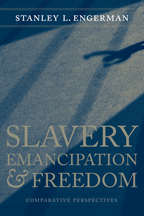
128 pages / 5.00 x 7.50 inches / None
History / American History | Social Studies / Slavery Studies
It is beyond dispute that slavery has always been abhorrent and, wherever it still exists, should be abolished. Where most scholarly writing on slavery in the past has concentrated on examining slaves as victims, recent writings have taken a more nuanced view of slavery in focusing on the slaves themselves and their cultural and psychological accomplishments in captivity. Also, studies of the system's profitability have shown that, from an economic perspective, slavery worked for the slaveholders and their society.
In Slavery, Emancipation, and Freedom, the distinguished scholar Stanley Engerman succinctly synthesizes current scholarship and addresses questions that are critical to understanding the nature of slavery: Why did slavery arise, and how, why, where, and when did it legally end? What impact did slavery have on the enslaved? Was the impact lingering or was it reversed by the provision of freedom?
Engerman begins his study by discussing slavery from a global perspective. He reminds us of the ubiquity of slavery throughout the world, challenging the stereotype that it was only the American South's "peculiar institution." Using the same broad comparative and temporal approach to discuss emancipation, he shows how emancipation in the southern states, several decades after it began in other parts of the world, both differed from and mirrored abolition around the globe.
Slavery, Emancipation, and Freedom is an important confrontation with America's and the world's past and present. Both the breadth and depth of this brief, incisive treatise demonstrate why Engerman is considered one of America's most insightful and respected scholars.
“A timely, original, and lucid work of informed synthesis, penetrating insight, and incisive analysis.”—The Historian
“A small book with big ideas. In less than one hundred pages of text, Stanley Engerman seeks nothing less than to analyze the history of slavery and emancipation. He succeeds admirably. Slavery, Emancipation, & Freedom is filled with provocative questions and important insights put forward in disarmingly understated prose.”—John Majewski, Civil War History
“Pointed and insightful comments abound in Stanley Engerman’s wide-ranging study. . . . Engerman has provided us with an essential work on slavery and abolition that is both a cogent historical overview and a reflection on the legacies not only of slavery but also of the abolitionist struggle that continues to shape our historical and political imagination.”—Slavery and Abolition
“Despite the substantive value of this work, its inferences are likely to provoke as much controversy as Engerman’s earlier work.”—Booklist
“Ever an iconoclast, [Engerman] looks forward to his reconsiderations of the meaning of freedom.”—North Carolina Historical Review
Found an Error? Tell us about it.